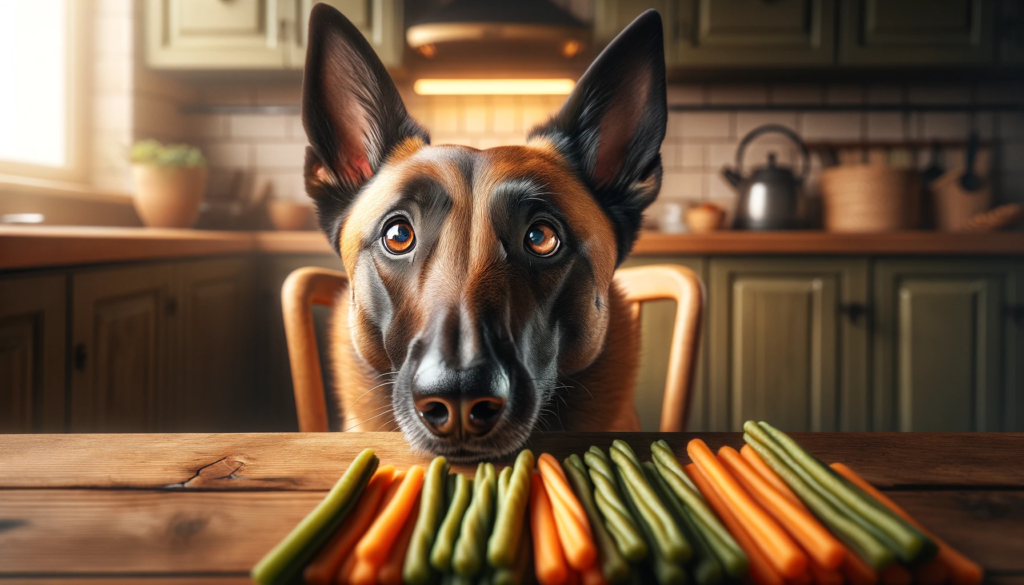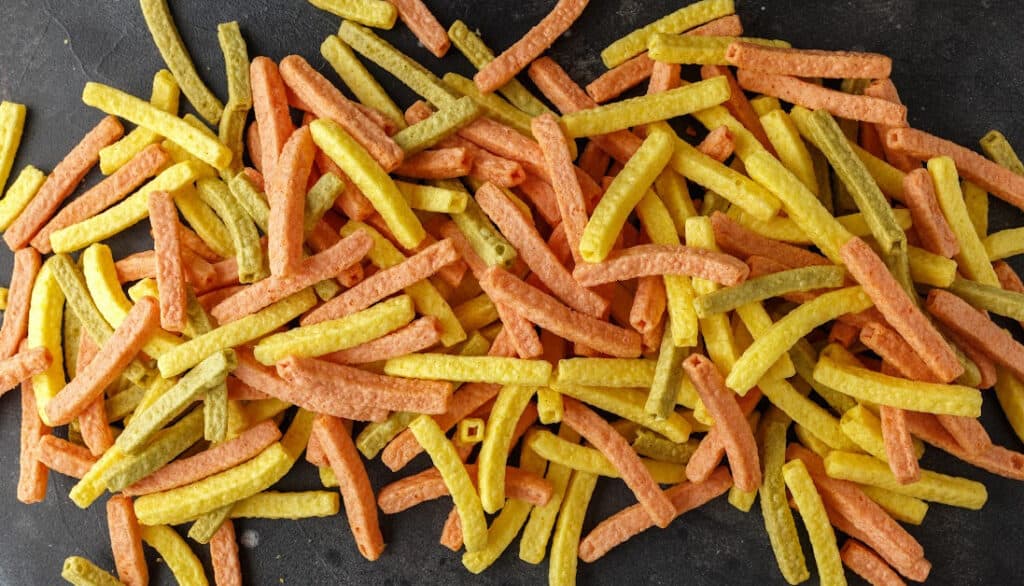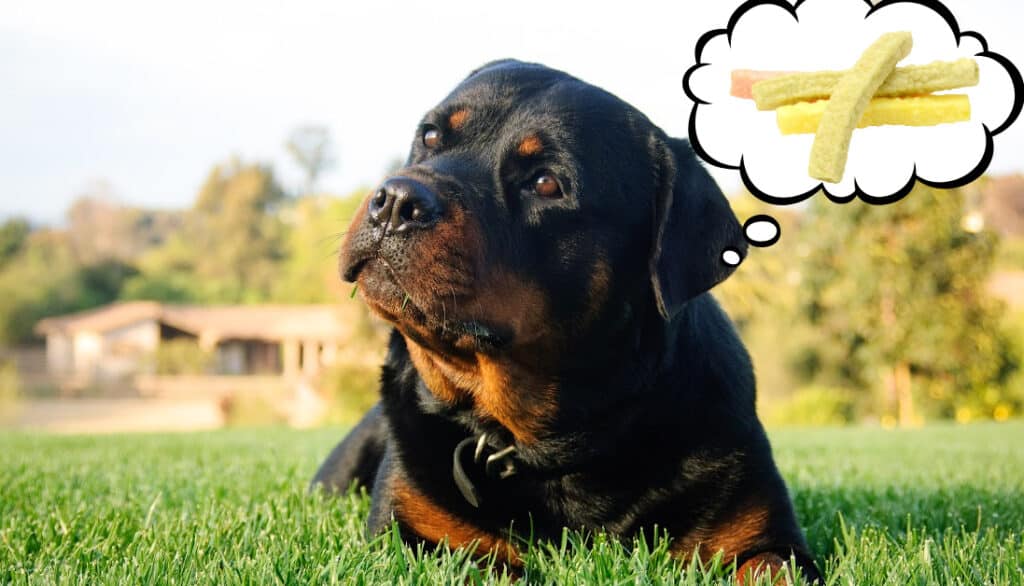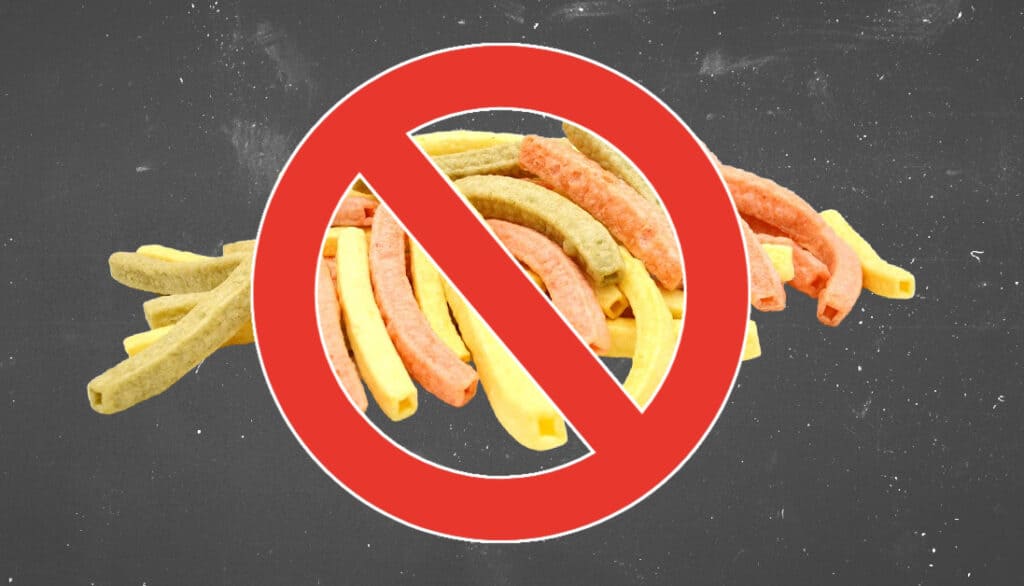Veggie straws have become increasingly popular among humans in recent years as a snack option. These crispy treats are marketed as a healthier alternative to traditional potato chips and other processed snacks. This makes them a popular choice for those looking to make healthier choices in their diet. Have you ever wondered “Can dogs eat veggie straws?” The short answer is no, dogs should not eat veggie straws.
One of the main reasons for the popularity of veggie straws is their perceived health benefits. Made from real vegetables such as potatoes, spinach, and tomatoes, many people believe that they are getting essential vitamins and minerals while satisfying their cravings for something crunchy and salty.
Another reason why veggie straws have become so popular is that they come in a variety of flavors. From classic sea salt to more exotic options like ranch or BBQ. There seems to be a flavor for everyone’s taste buds.

Can Dogs Enjoy Veggie Straws Too?
With the rise in popularity of veggie straws among humans, it’s only natural that pet owners would wonder if their furry friends can enjoy this snack too. After all, dogs love crunchy snacks just as much as we do!
However, the answer isn’t quite as straightforward as one might think. Veggie straws may seem like a healthy snack option because they contain vegetables. However, it’s important to remember that dogs have different nutritional needs than humans.
When considering whether or not dogs can eat veggie straws, there are several factors to consider. For example, what are the ingredients in the veggie straws?
Are there any potential health risks associated with feeding dogs processed snacks like these? In addition to these questions, it’s also important to consider how your dog’s digestive system may react to eating something like veggie straws.
Some dogs may have no problem digesting them. Others may experience stomach upset or even vomiting if they consume too many processed snacks. Overall, while it may be tempting to share your veggie straws with your furry friend, it’s best to err on the side of caution and stick to dog-friendly snack options.

Overview of Veggie Straws
What are Veggie Straws?
Veggie straws are a popular snack food that has gained popularity in recent years due to their crunchy texture and perceived health benefits. These snacks are typically made of a combination of potato starch, cornstarch, and vegetable powders like spinach, tomato, and beetroot. They are shaped like small tubes or sticks and often come in a variety of flavors.
How are Veggie Straws Made?
To make veggie straws, combine the ingredients to create a dough-like mixture for veggie straws. Then, feed this mixture into a machine, which extrudes it into small tubes or sticks. Finally, bake these snacks until they reach a crisp and crunchy texture.
Nutritional Value of Veggie Straws
One of the main selling points of veggie straws is their perceived nutritional value. While they do contain some vegetable powders, it’s important to note that they are still processed snack food. They should not be considered a replacement for fresh vegetables in your diet.
That being said, some brands of veggie straws boast being lower in fat than traditional potato chips and may also contain less sodium. They may also contain vitamins like vitamin A or vitamin C from the vegetable powder ingredients.

Potential Health Benefits for Humans
There isn’t much research on the specific health benefits of eating veggie straws. Consuming more vegetables in general can have many positive health effects. Vegetables contain fiber which can aid digestion and help you feel full longer.
They also provide important vitamins and minerals that your body needs to function properly. Some studies have also suggested that consuming more vegetables can help reduce your risk for chronic diseases such as heart disease, diabetes, and certain types of cancer.
The Bottom Line
Veggie straws may be a tasty and fun snack option. It’s important to remember that they are still processed food. They should not be relied upon as a primary source of vegetables in your diet. It’s always best to aim for fresh, whole vegetables whenever possible.
That being said, if you’re looking for a crunchy snack that’s lower in fat and sodium than traditional potato chips, veggie straws could be an option worth considering. Just be sure to read the label and choose brands with simple ingredient lists and minimal added sugars or artificial flavors.

Can Dogs Eat Veggie Straws?
The short answer is no, dogs should not eat veggie straws. While veggie straws may seem like a healthy snack option for humans, they are not nutritionally appropriate for dogs. In fact, feeding your dog veggie straws could potentially lead to health issues and complications.
One of the main reasons why veggie straws are not suitable for dogs is that they are highly processed and contain ingredients that may be harmful to them. Many brands of veggie straws contain onion powder or garlic powder. Both of these are toxic to dogs in large quantities.
Additionally, the high salt content in these snacks can be harmful to your dog’s health. This is true especially if they have kidney or heart problems. Moreover, although some ingredients in veggie straws may be safe for dogs in small amounts such as potato starch and cornstarch which have low nutritional value and low digestibility rate.
Feeding your dog processed snacks like veggie straws can cause stomach upset. This includes diarrhea because their digestive system isn’t built for digesting human foods. While some people may argue that their dog has eaten veggie straws without any ill effects, it’s important to remember that every dog is different and may react differently to certain foods.
Just because one dog was fine after eating a few stray pieces of veggie straw doesn’t mean that it’s safe or healthy for all dogs. If you’re looking for a snack option for your furry friend, there are plenty of healthier alternatives out there.
While it may be tempting to share your favorite snack with your four-legged friend, it’s important to remember that not all human foods are safe for dogs. Veggie straws, in particular, are highly processed and contain ingredients that can be toxic to dogs.

Potential Risks for Dogs Eating Veggie Straws
Dangerous Ingredients in Veggie Straws
Veggie straws are made from a combination of carrots, potatoes, and spinach. However, some manufacturers add additional ingredients to enhance the flavor or color of the snack.
Some of these added ingredients can be harmful to dogs. For example, onion powder and garlic powder are often included in veggie straws to give them a savory taste.
These ingredients can damage a dog’s red blood cells and cause anemia if ingested in large quantities. Another danger ingredient is salt.
Most veggie straws contain a high amount of sodium which can lead to dehydration if consumed excessively by your pooch. Too much salt can also cause electrolyte imbalances which could lead to other health issues.
Digestive Issues From Processed Snacks Like Veggie Straws
Veggie straws are processed snacks that contain artificial flavors and colors. They also contain preservatives that help to extend their shelf life. Unfortunately, these additives may cause digestive issues such as diarrhea or vomiting in dogs with sensitive stomachs. Moreover, the high fiber content in veggie straws may be too much for some dogs to handle which could lead to bloating and gas.
The Importance of Reading Labels Before Giving Treats
It is important always to check the label before giving your dog any snack including dog treats or human food such as veggie straws. Some seemingly healthy foods may include dangerous substances that will harm your furry friend. Checking food labels allows you to note any harmful ingredients beforehand. This way you can avoid them entirely while buying snacks for your dog at home.
Consulting A Veterinarian Before Introducing New Foods Into Your Dog’s Diet
In case you’re unsure what type of treats are safe for your dog, or if you’re considering adding new food to their diet, it’s always best to consult with your veterinarian first. Your vet may suggest specific snacks or foods that are ideal for your dog’s specific dietary requirements depending on their age, breed, and activity level. Your veterinarian can also help you determine the appropriate serving size based on your dog’s weight and calorie needs.
Veggie straws aren’t necessarily toxic to dogs but they could potentially cause digestive issues and contain harmful ingredients. Onion powder, garlic powder, and salt could lead to health complications if consumed excessively. When it comes to feeding dogs any human food or treats even those labeled healthy, it is always best first to consult with a veterinarian before introducing anything new into their diet.

Alternatives to Veggie Straws for Dogs
Dog-Friendly Snacks
While veggie straws may seem like a healthy snack option for humans, they are not necessarily the best choice for our furry friends. However, there are plenty of other alternatives that can be just as tasty and even more nutritious for dogs.
One great option is carrots. Not only are they low in calories, but they also contain vitamins and minerals that can benefit a dog’s overall health.
Carrots are also great for promoting healthy teeth and gums due to their crunchy texture. Another alternative is green beans.
These vegetables are rich in fiber and protein, making them an excellent source of nutrition for dogs. They also contain antioxidants that can help support a dog’s immune system.
Other healthy snack options for dogs include apples, bananas, blueberries, and pumpkin puree. These snacks not only provide essential vitamins and minerals but also add variety to a dog’s diet.
The Importance of Consulting with a Veterinarian
Before introducing any new food into a dog’s diet, it is always important to consult with a veterinarian first. While some foods may seem harmless or even beneficial to us humans, they may pose potential risks or complications for our pets.
For example, certain fruits such as grapes or raisins can cause kidney failure in dogs if ingested in large amounts. Additionally, some human foods may be high in fat or salt content which can lead to digestive issues or obesity in dogs.
By consulting with a veterinarian before introducing new foods into their diet, pet owners can ensure that they are providing their furry friend with the proper nutrition while minimizing potential risks. While veggie straws may seem like an appealing snack option due to their crunchy texture and vegetable-based ingredients, they might not be the best choice for our dogs.
Instead, opting for healthier, dog-friendly snacks such as carrots or green beans can provide our pets with the nutrition they need while reducing potential health risks. Remember to always consult with a veterinarian before introducing new foods into a dog’s diet to ensure their health and wellness.

Conclusion: Can Dogs Eat Veggie Straws?
After much discussion and analysis, the answer to the question “Can dogs eat veggie straws?” is: it depends. While veggie straws themselves are not inherently toxic to dogs, the ingredients they contain can be harmful if consumed in large quantities.
Onion powder and garlic powder, two common ingredients found in veggie straws, can cause gastrointestinal distress and anemia in dogs. While it may be tempting to share your snack with your furry friend, it’s important to consider their nutritional needs and digestive system.
Dogs require a diet that is high in protein and fat, while also containing essential vitamins and minerals. Veggie straws are a processed snack that lack many of these necessary nutrients.
However, if you still want to give your dog a taste of veggie straws as a special treat, there are some precautions you can take. First, make sure that the particular brand of veggie straws you choose does not contain any potentially harmful ingredients like onion or garlic powder.
Second, only feed them in moderation as an occasional treat rather than as a regular part of their diet. Overall though, there are many healthier alternatives for dog treats that offer more nutritional value such as carrots or green beans which provide fiber and vitamins without the risk of any harmful additives.
When considering introducing new foods into your dog’s diet it’s always best to consult with your veterinarian first. They will be able to provide specific recommendations based on your dog’s individual needs and health history.
While it is technically possible for dogs to eat veggie straws, there are certainly better snack options out there for our furry friends. By making informed decisions about what we feed our pets we can ensure they stay healthy and happy for years to come!
~Lindsie
